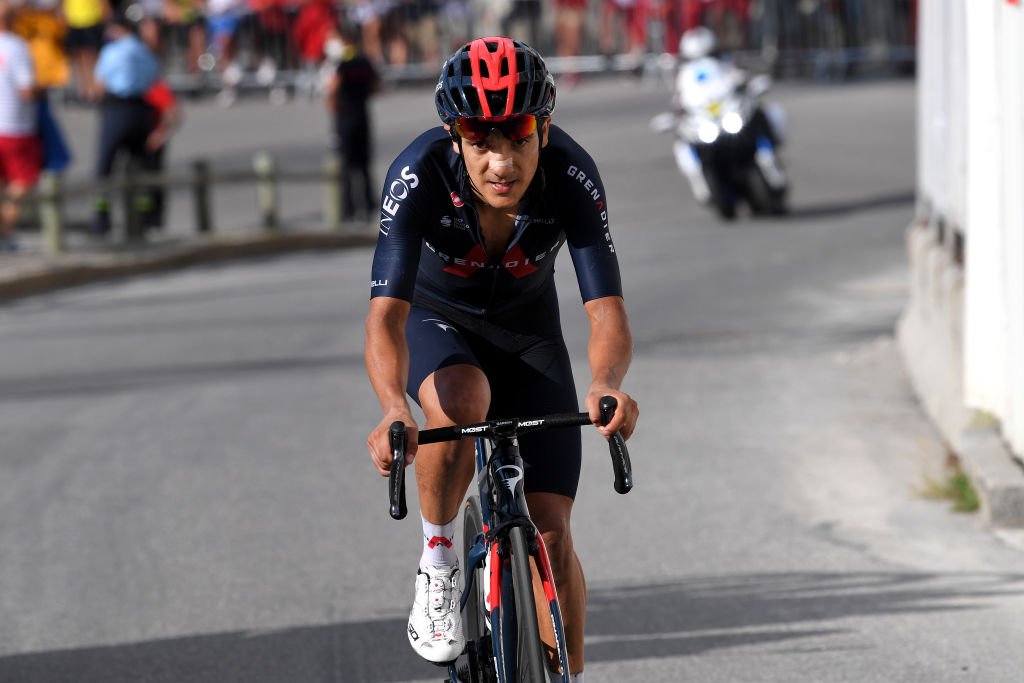Richard Carapaz upbeat about Vuelta a España ambitions
Ecuadorian to lead Ineos-Grenadiers after season of change

When Richard Carapaz claimed on Monday that "it's been a very strange season," the Ineos Grenadiers rider can talk from personal experience.
Carapaz switched from Movistar to Ineos Grenadiers in January and did one race, the Tour Colombia, before enduring a lockdown of nearly six months in Ecuador and then faced a massively rescheduled season. When Carapaz finally reached Europe in mid-July, his initial target of the season, a second victory in Giro d'Italia, was abruptly substituted for a support role in the Tour de France. When Egan Bernal quit the Tour with a back problem, Carapaz and his teammates went on the attack for stage victories and he finished a close second in the mountains competition.
Now Carapaz has now been tasked with leading Ineos Grenadiers in the Vuelta a España.
The Vuelta has never smiled particularly broadly on Carapaz in his previous two participations, but nor has it seen him in serious trouble. 36th in his first Vuelta back in 2017, the Ecuadorian rider finished 18th in his second participation in 2018, when he had already taken fourth overall in the Giro d'Italia earlier that year.
In 2019, Carapaz was due to be part of a triumvirate of top Movistar contenders with Nairo Quintana and Alejandro Valverde, but in somewhat controversial circumstances, injuries incurred in an accident in a summer criterium meant he was unable to start the race.
Over a year later, Carapaz is finally back and is Ineos Grenadiers team leader as doubts still remain about Chris Froome's form.
Although he has said elsewhere that he believes he is more suited to the Giro's longer climbs and cooler weather than the Vuelta's shorter, punchier ascents and usual blistering summer temperatures, this autumn the late start could well suit Carapaz. And the Vuelta's multiple Pyrenean ascents on Sunday, including the Tourmalet, could give him an early advantage.
Get The Leadout Newsletter
The latest race content, interviews, features, reviews and expert buying guides, direct to your inbox!
"It's been a very strange season for everybody but I'm very motivated and I'm very keen to do it really well and we've got a great team for that. I hope it all goes well, and I hope I can be in the fight for this Grand Tour," Carapaz said on Monday morning, just 124 hours from the first stage in the hilly Basque Country.
"The first week will be really important for the outcome of the whole Vuelta, it's going to be a very nervous first stage and critical for GC," he pointed out. "So you'll have to be focussed right from the start."
"I'm in good shape, and feeling really motivated to go for it in the Vuelta. I think I can be up there in the fight for it, we've got a very strong team and we've keen to get into it."
Quite apart from good form, local knowledge is on his side. Movistar is based in nearby Pamplona as is development team Lizarte. Carapaz lived in the area as an amateur and has tackled a lot of the climbs in the first part of the Vuelta.
Carapaz's time trialling and climbing talents netted him a Grand Tour victory at his third attempt in the 2019 Giro as he played off the rivalry between Vincenzo Nibali and Primoz Roglic. This time he can also count on some formidable team support, with powerhouses like Andrey Amador and Michal Golas part of the Ineos Grenadiers line-up, as are skilled young climbers like Ivan Sosa or Australian all-rounder Cameron Wurf.
Assuming Chris Froome's form is improving, Carapaz will have the luxury of the four-time Tour de France winner backing him in the mountains.
"The Vuelta is a crucial race for the whole team, we'll all work together to take our chances," Carapaz said diplomatically. "Chris is a great rider, hugely experienced and we've all got a lot of faith in him."
But while Froome is still uncertain of his form, perhaps an even more relevant question for Carapaz and the rest of the peloton in the ultra-difficult first week is whether the Vuelta will be full-on from the start or if riders choose to race more conservatively.
"The first week is very important, everybody knows that the first stages are actually pretty hard," Carapaz argued.
"We'll see what the teams do, but the key thing is that you have race smart, and remember that every second you can lose in the first week can end up mattering a lot come the final reckoning."
Alasdair Fotheringham has been reporting on cycling since 1991. He has covered every Tour de France since 1992 bar one, as well as numerous other bike races of all shapes and sizes, ranging from the Olympic Games in 2008 to the now sadly defunct Subida a Urkiola hill climb in Spain. As well as working for Cyclingnews, he has also written for The Independent, The Guardian, ProCycling, The Express and Reuters.
